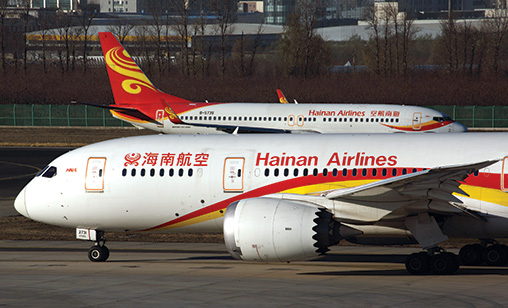Addendum
HNA: domestic break-up?
June 1st 2019
The industry is watching ownership changes at HNA Group’s domestic airlines. Read More » The Mainland conglomerate is in the spotlight after it sold assets of US$25 billion in 18 months following a debt-fuelled spending spree. HNA Group’s costly expansion was mostly international and outside its core aviation and tourism focus. Before this costly and diverse growth, HNA succeeded in achieving at least a 15% domestic market share with most other capacity affiliated with one of the three state-owned airline groups.
This success is being unwound as the group seeks cash. Hainan Airlines is its flagship carrier, but Tianjin Airlines and Beijing Capital Airlines have had a significant presence in the market. In recent years, HNA has partnered with local provinces to establish airlines such as Fuzhou Airlines and Urumqi Airlines.
 |
HNA’s airline asset sale is starting small. Last November, it announced its intention to reduce its financial holding in Urumqi Airlines from 70% to 30%. Urumqi Airlines has 18 aircraft, small for HNA.
Larger is Lucky Air, which has 55 aircraft, including wide bodies, and has been converted to an LCC. No transaction has been completed to confirm local reports that HNA would sell Kunming-based Lucky Air to China Eastern Airlines and Yunnan Province. Kunming is the province’s capital city.
China Eastern Airlines has a large base in Kunming, which it positions as a gateway to Southeast Asia and the Indian sub-continent. In March 2018, HNA denied it would sell Beijing Capital Airlines to Air China (AC). Capital Airlines, which has 89 aircraft, would have enlarged AC’s footprint in the key Beijing-Tianjin area.
HNA has told other subsidiaries, as it did Hong Kong Airlines (HKA), that it would no longer fund them. In 2018, Tianjin Airlines, with 90 aircraft, received a US$64 million capital injection linked to the Tianjin government. HNA did not contribute.
HNA is in the process of selling HK Express to Cathay Pacific. HNA has solicited bids for HKA. HKA carries mainland China-Hong Kong traffic as well as connecting traffic to and from mainland China via Hong Kong. But HNA’s other investments were not so related to China. HNA has offloaded holdings in Brazil’s Azul, Portugal’s TAP and South Africa’s Comair.
Industry observers agree HNA would not want to sell Hainan Airlines, which is the largest airline in its airline stable, at 239 aircraft. Other than Hainan Airlines, there is no consensus about the fate of HNA.